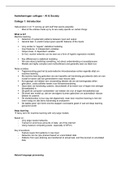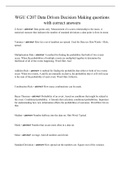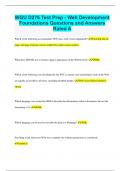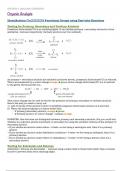Aantekeningen colleges – AI & Society
College 1: Introduction
Hallucination in AI coming up with stuff that seems plausible
- Most of the articles made up by AI are really specific on certain things
What is AI?
Machine learning
Detection of systematic patterns between input and output
General task predict output given specific features of the inputs
Very similar to “regular” statistical modeling
- Input features independent variables
- Output class dependent variable
- (In fact, neutral networks can be seen as a form of logistic regression models)
Key differences to statistical modeling
- We care about predicting something, not about understanding a (causal)process
- Models are highly complex (and multicollinear) and generally seen as black box
Notes at slides:
Tegenwoording gaat het bij automatische inhoudsanalyse echter eigenlijk altijd om
machine learning
Bij machine learning gebruiken we een beparkte set handmatig gecodeerde data om een
model te trainen dat kan generaliseren naar nieuwe data
Kort gezegd: we hebben een verzameling teksten die we als trainingsdata willen
gebruiken, zoals politieke tweets over klimaatverandering
Deze laten we handmatig coderen, bijvoorbeeld of de tweet voor of tegen ene strenger
klimaatbeleid is
Dit geeft de computer voorbeelden van teksten die voor of tegen klimaatbeleid zijn
Dit elvert een model op, dat we vervolgens kunnen gebruiken om automatisch nieuwe
teksten te coderen
De studentcodeur is dus nog niet afgeschadt, maar door machine learning is het niet
meer nodig om alle items handmatig te analyseren
De laatste jaren zijn hierin enorme stappen voorwaarts gezet in wat wel deep learning
genoemd wordt
Deep learning
fancy term for machine learning with very large models
Based on:
- Very large neutral networks
- Trained on enormous amounts of data, ‘all of the internet’
- Using massive computing power, especially of GPU’s
Key innovations:
- Feature layers find patterns in raw input
- Networks can be (pre-)trained based on unannotated data
- Patterns from (pre-)training are transferred to actual task, and fine-tunned on annotated
data
Natural language processing
, Core application area of AI
Research field of NLP or Computational Linguistics
Can the computer understand, generate, or translate text?
Generally cast as machine learning problems:
- Predict specific meaning given text
- Generate (=predict most likely) newspaper article given prompt
Recent innovations all based on ‘BERT’ decoder-encoder architecture that builds layers of
understanding training using tasks such as ‘predict the next word’
Robotics
Embodied intelligence AI used to navigate/understand and manipulate environment
- Industrial robots
- Automotive AI
- Conversational/care robots
AI in a complex world
1. Scale of digitization digital traces as research objects
2. AI/ Digitization build on existing technologies
3. Global reach of AI/digitization
4. Ubiquity of AI/digitization
5. Increasing complexity of digitized/AI-systems
6. Intrusiveness of digital/AI technology
Ethics of AI: main debates
Privacy, manipulation, opacity, bias, autonomy, singularity
Example facial recognition technology is used in many parts of China nowadays that tracks the
emotions of people, and you can only enter some metro stations if your past behavior has gotten
a high score in the nationwide system of data-sharing
- What is the role of privacy in the face of machine learning?
- How do anonymous data dude from decisions based on personal data?
- Is the GDPR a good and sufficient instrument?
Ai & Journalism (JMCQ 2019 invited forum)
Meredith Broussard
- Center humans, consider economics, explain what AI is or isn’t
- Not what can AI do, but what should AI do
Nicholas Diakopoulos
- AI as a medium to express journalistic values, value-centered design
- Need to study human centered (hybridized) AI
Andrea Guzman
- Need to cross divides in research (and applications)
- Disciplinary divides, technological divides, theoretical divides
- Human machine communication as research agenda
Rediet Abebe
- Biases or limitations often discriminatory
- Need for inclusion/representation of communities
Michel Dupagne & Ching-Hua Chan
- More research into fear of and resistance to technology
- Need to adapt education to changing reality
Conclusions
, AI is a group of techniques clustered around machine learning
Deep neutral networks can achieve spectacular results
- Text/image generation, understanding, translation, decision making
AI associated with various problems
- Bias
- Inequality
Regulating/fixing AI requires a deep understanding of…
- What Ai is
- How it affects (various aspects of) society
- How solutions/regulation interacts with technology, users, owners, society
Interdisciplinary research and solutions are key
College 1: Introduction
Hallucination in AI coming up with stuff that seems plausible
- Most of the articles made up by AI are really specific on certain things
What is AI?
Machine learning
Detection of systematic patterns between input and output
General task predict output given specific features of the inputs
Very similar to “regular” statistical modeling
- Input features independent variables
- Output class dependent variable
- (In fact, neutral networks can be seen as a form of logistic regression models)
Key differences to statistical modeling
- We care about predicting something, not about understanding a (causal)process
- Models are highly complex (and multicollinear) and generally seen as black box
Notes at slides:
Tegenwoording gaat het bij automatische inhoudsanalyse echter eigenlijk altijd om
machine learning
Bij machine learning gebruiken we een beparkte set handmatig gecodeerde data om een
model te trainen dat kan generaliseren naar nieuwe data
Kort gezegd: we hebben een verzameling teksten die we als trainingsdata willen
gebruiken, zoals politieke tweets over klimaatverandering
Deze laten we handmatig coderen, bijvoorbeeld of de tweet voor of tegen ene strenger
klimaatbeleid is
Dit geeft de computer voorbeelden van teksten die voor of tegen klimaatbeleid zijn
Dit elvert een model op, dat we vervolgens kunnen gebruiken om automatisch nieuwe
teksten te coderen
De studentcodeur is dus nog niet afgeschadt, maar door machine learning is het niet
meer nodig om alle items handmatig te analyseren
De laatste jaren zijn hierin enorme stappen voorwaarts gezet in wat wel deep learning
genoemd wordt
Deep learning
fancy term for machine learning with very large models
Based on:
- Very large neutral networks
- Trained on enormous amounts of data, ‘all of the internet’
- Using massive computing power, especially of GPU’s
Key innovations:
- Feature layers find patterns in raw input
- Networks can be (pre-)trained based on unannotated data
- Patterns from (pre-)training are transferred to actual task, and fine-tunned on annotated
data
Natural language processing
, Core application area of AI
Research field of NLP or Computational Linguistics
Can the computer understand, generate, or translate text?
Generally cast as machine learning problems:
- Predict specific meaning given text
- Generate (=predict most likely) newspaper article given prompt
Recent innovations all based on ‘BERT’ decoder-encoder architecture that builds layers of
understanding training using tasks such as ‘predict the next word’
Robotics
Embodied intelligence AI used to navigate/understand and manipulate environment
- Industrial robots
- Automotive AI
- Conversational/care robots
AI in a complex world
1. Scale of digitization digital traces as research objects
2. AI/ Digitization build on existing technologies
3. Global reach of AI/digitization
4. Ubiquity of AI/digitization
5. Increasing complexity of digitized/AI-systems
6. Intrusiveness of digital/AI technology
Ethics of AI: main debates
Privacy, manipulation, opacity, bias, autonomy, singularity
Example facial recognition technology is used in many parts of China nowadays that tracks the
emotions of people, and you can only enter some metro stations if your past behavior has gotten
a high score in the nationwide system of data-sharing
- What is the role of privacy in the face of machine learning?
- How do anonymous data dude from decisions based on personal data?
- Is the GDPR a good and sufficient instrument?
Ai & Journalism (JMCQ 2019 invited forum)
Meredith Broussard
- Center humans, consider economics, explain what AI is or isn’t
- Not what can AI do, but what should AI do
Nicholas Diakopoulos
- AI as a medium to express journalistic values, value-centered design
- Need to study human centered (hybridized) AI
Andrea Guzman
- Need to cross divides in research (and applications)
- Disciplinary divides, technological divides, theoretical divides
- Human machine communication as research agenda
Rediet Abebe
- Biases or limitations often discriminatory
- Need for inclusion/representation of communities
Michel Dupagne & Ching-Hua Chan
- More research into fear of and resistance to technology
- Need to adapt education to changing reality
Conclusions
, AI is a group of techniques clustered around machine learning
Deep neutral networks can achieve spectacular results
- Text/image generation, understanding, translation, decision making
AI associated with various problems
- Bias
- Inequality
Regulating/fixing AI requires a deep understanding of…
- What Ai is
- How it affects (various aspects of) society
- How solutions/regulation interacts with technology, users, owners, society
Interdisciplinary research and solutions are key











